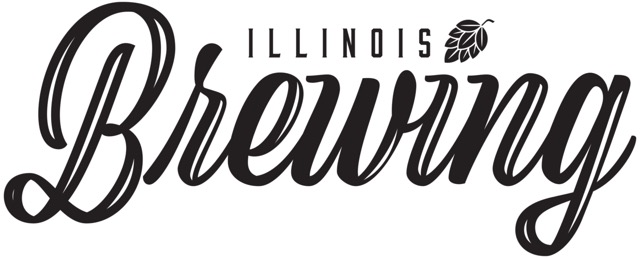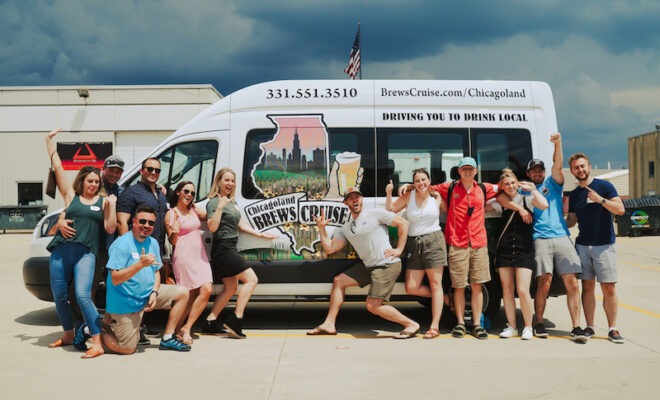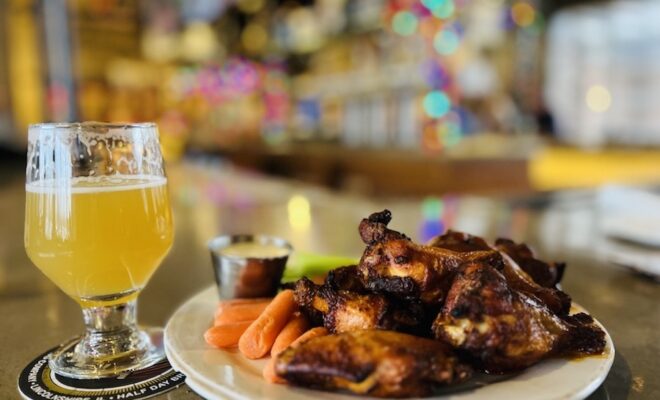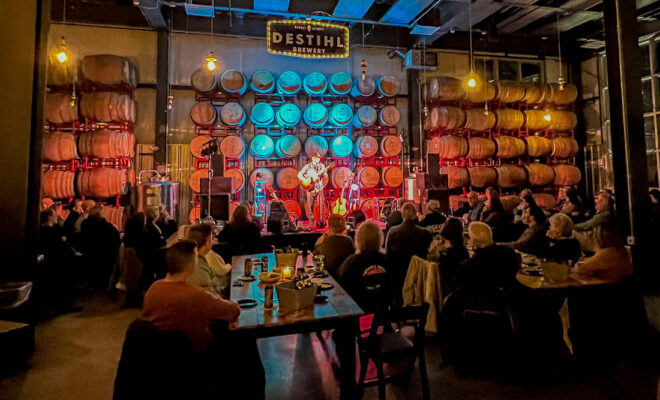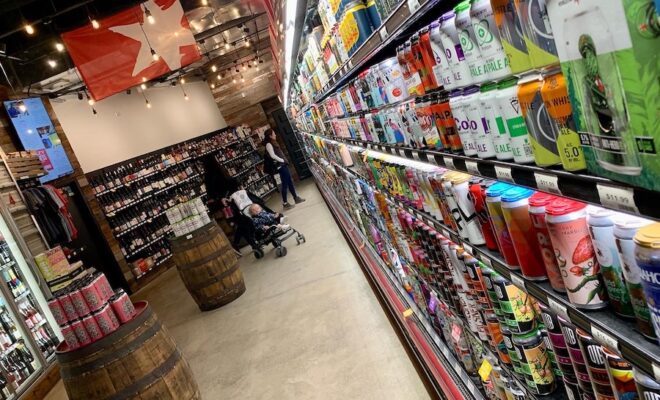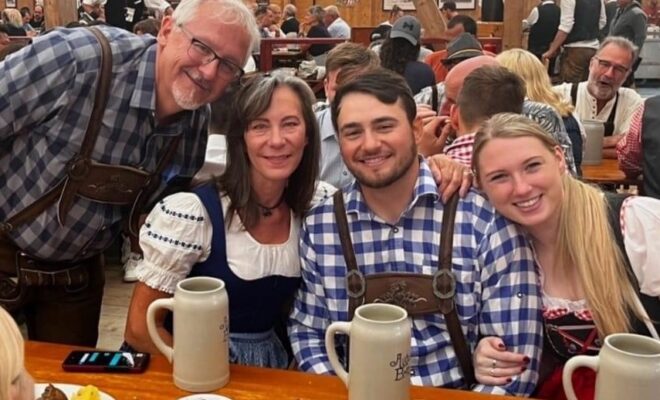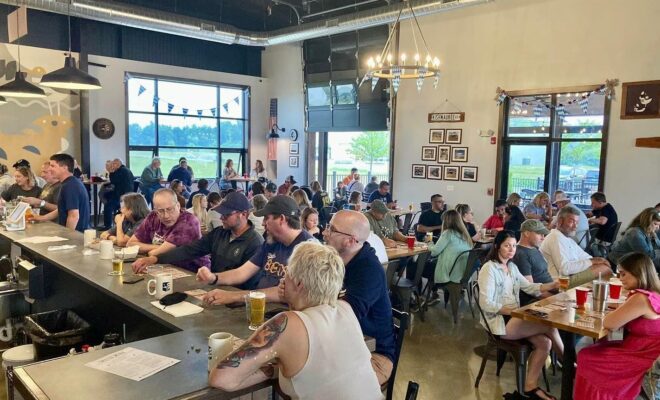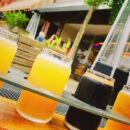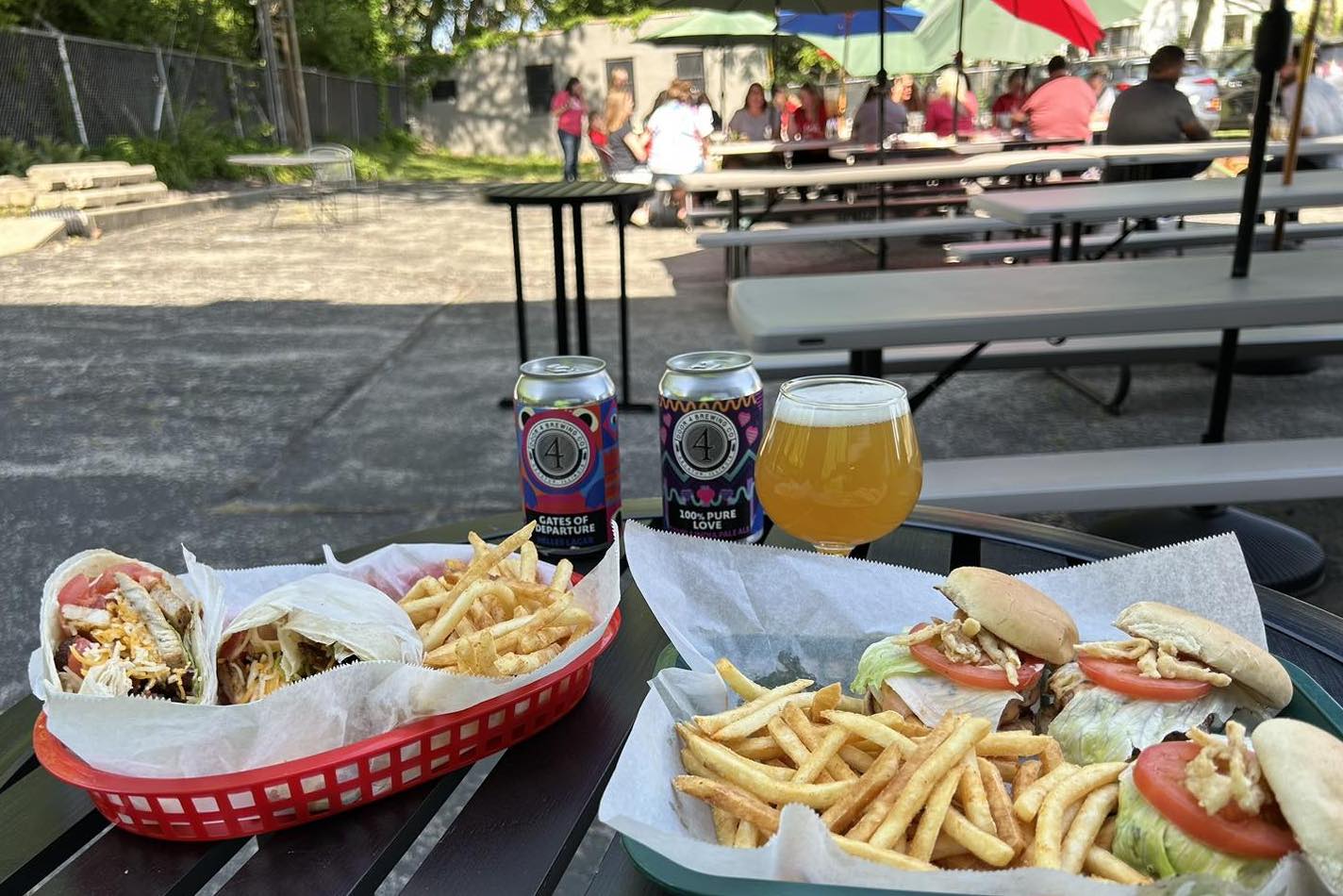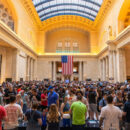Breweries in Bunches: Chicago’s Malt Row district just happens to be one of the more prolific craft beer neighborhoods in the country
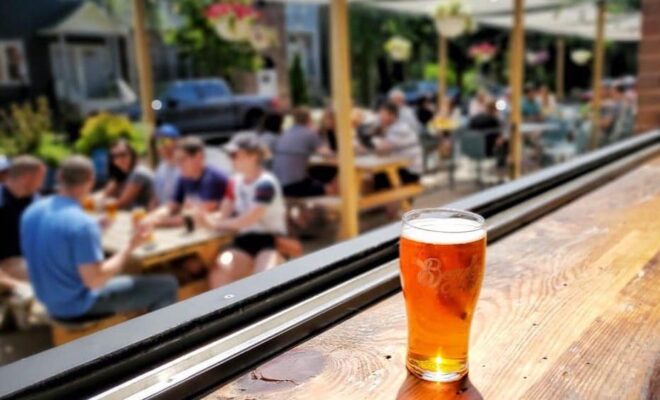
By Trent Modglin
Begyle Brewing
1800 W. Cuyler Ave.
BegyleBrewing.com
Details: Back when co-owner Kevin Cary moved to Chicago in 2007, there were maybe a half dozen craft breweries in town, so when he and his roommate, Matt Ritchey, began home brewing, it wasn’t exactly easy to transition into full-time jobs making beer for a living. Fortunately for them, they possessed an entrepreneurial spirit and made the jump to the planning stages for Begyle in 2011 and brewing their first batch in 2012, becoming just the 12th craft brewery in Chicago (which now is home to around 100).
Choosing the Ravenswood Corridor and a brick-and-timber building that’s 100 years old located alongside a residential neighborhood was equal parts quality research and dumb luck, as they happened to call the number on the side of a building just as the tenant was moving out after 10 years. Foot traffic from the nearby CTA brown line and developing a reliable customer base have been instrumental, as evidenced by the fact Begyle still doesn’t have an exterior sign 10 years later.
What they’re known for: A brand that is community supported and approachable to any level of beer drinker. “We’ve always brewed a lot of different styles,” Cary tells us. “We’ve leaned into trends when we needed to and had some success with barrel aging, but the goal is always to provide a very robust lineup of beers that are well made.”
Begyle’s Free Bird pale ale, Hophazardly IPA and blonde ale brewed with Midwestern honey draw a lot of attention, and for good reason, but don’t sleep on the Can’t Find a Bitter Man ESB or the crisp kolsch called Boat Shoes.
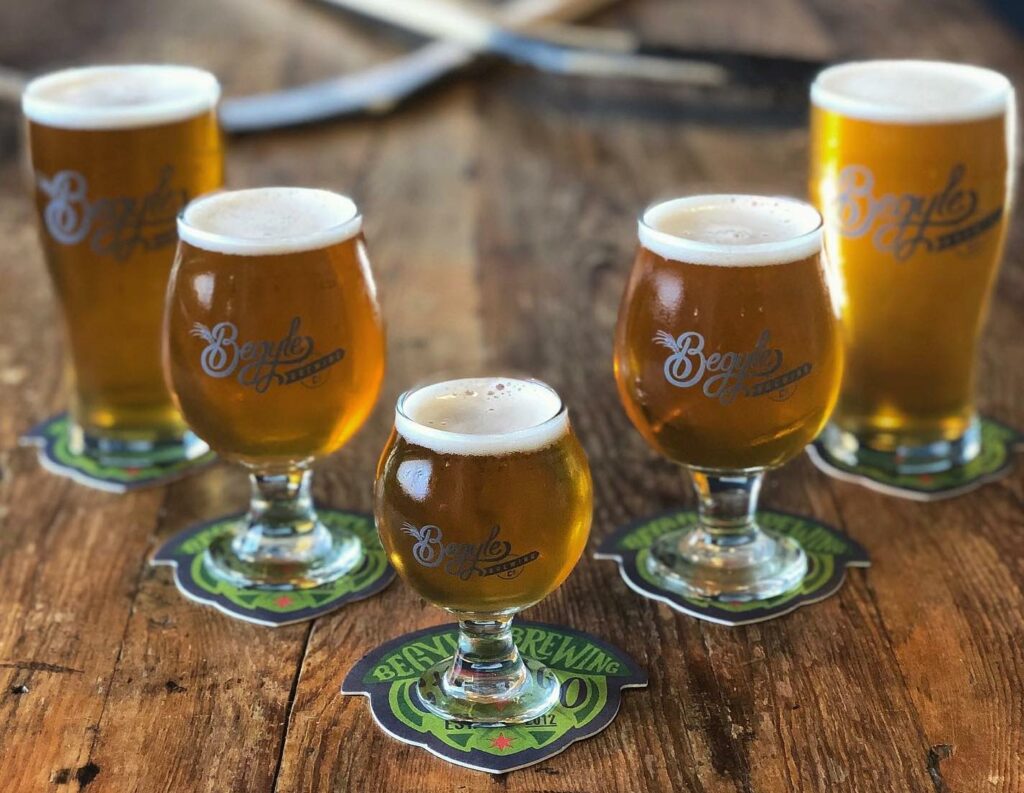
What caught your eye: Begyle has a clean, industrial interior and minimalistic approach that focuses more on the character of the space to go with a few creature comforts. Upon entry, you’re greeted with a type of fast-food counter service model for beer orders, which creates a welcoming level of efficiency without feeling rushed. Begyle’s sidewalk patio that seats 60 is a coveted spot in warm weather, and whiskey barrels doubling as tables in the taproom are ideal for sitting around.
“We’ve leaned into trends when we needed to and had some success with barrel aging, but the goal is always to provide a very robust lineup of beers that are well made.” —Begyle’s Kevin Cary
From the brewery: “Because of the challenges we faced during Covid as a small business, you don’t always see it through the same lens as the consumer, and it was easy to get down on yourself and forget about the good. But that’s why it’s so valuable to be a part of a community because that, ultimately, is what refuels the tank. … The team here has created this brand, and we’re getting people to spend their disposable income and their free time and they’re coming in to get to know you and your staff, and you find yourself building this larger family in the process. The customer is 100 percent the reason why we do this.” — Co-owner Kevin Cary
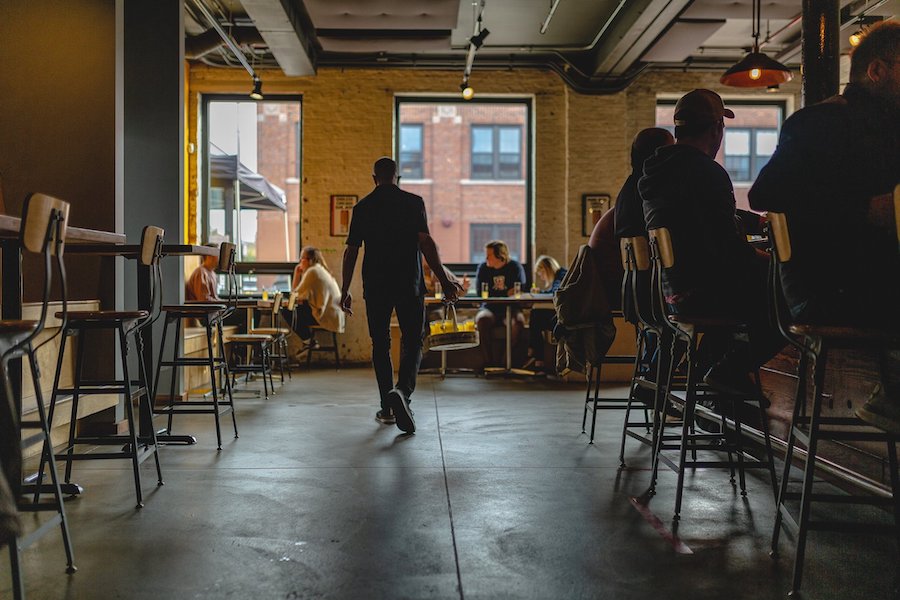
Dovetail Brewery
1800 W. Belle Plaine
DovetailBrewery.com
Details: They like to say: “We brew like monks, minus the vows” at Dovetail, where founders Hagen Dost and Bill Wesselink met in Germany while earning their Master Brewer certifications from the Siebel Institute. Housed across three floors of a 93-year-old building near the CTA brown line and Metra tracks, Dovetail offers a taproom, event space and spacious beer garden.
What they’re known for: Besides a popular Saturday brewery tour, Dovetail prides itself on “continental European styles brewed with traditional, old-world methods.”
Too often, the Dovetail team admits, they are mislabeled as “German only” or even “lager only.”
“We have lots more in our repertoire,” laughs Jenny Pfafflin, Dovetail’s marketing manager and co-brewer. “Like a robust fermentation program and plenty of styles to appeal to every beer drinker.”
Giving back: Dovetail sponsors the Growing Home program — an urban farm in Englewood that provides food, produce and job training for the local community — and hosts “Secret Garden” events to benefit Growing Home, where they release spontaneously fermented beers, host seminars on the history of lambic-style beers and give guests a chance to make their own blend.
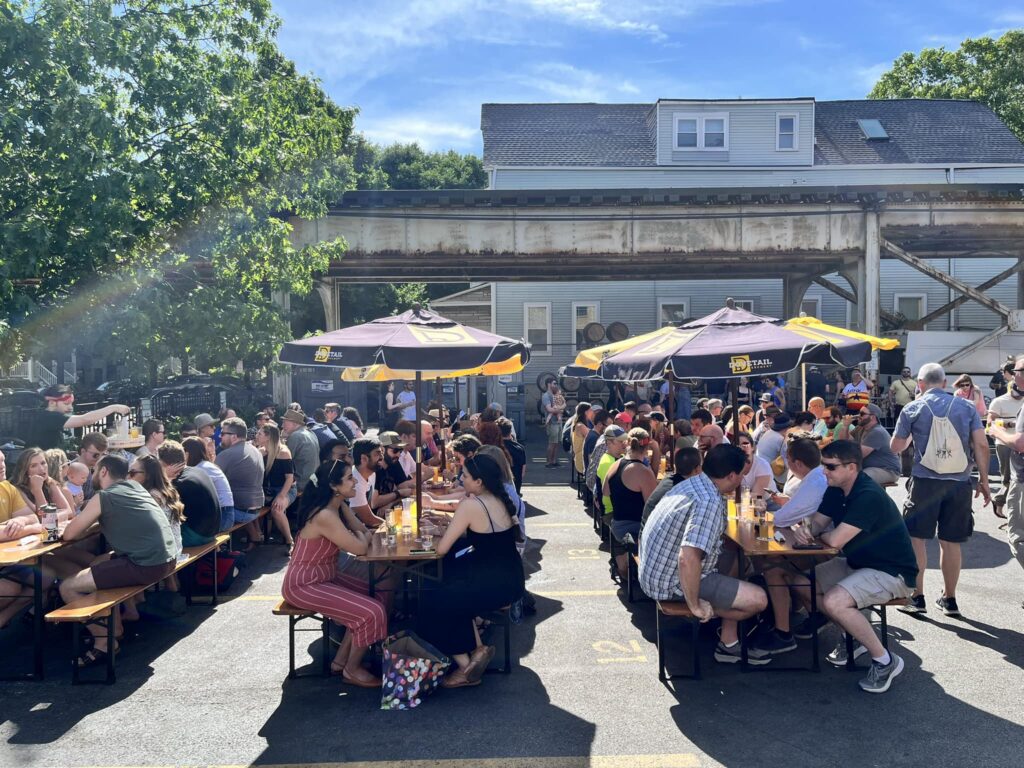
Our taproom tends to reflect tavern culture that is historic in Chicago, and we make beers in traditional ways, but it’s still a modern take on those beers. — Dovetail’s Jenny Pfafflin
What caught our eye: Mainly, a seriously underrated (and massive) beer garden in the parking lot next door, as well as a warm, neighborhood pub kind of vibe in the taproom. Their Vienna lager is one of the best we’ve had anywhere, and they also have a stellar saison that pays homage to Saison Dupont in the Belgian tradition. Another hit on the calendar was the release of their new Berliner weisse in August — Dovetail’s first sour that’s not lambic, which they were “pretty stoked about.” Not to be overlooked is the barrel loft, a private event space perfect for weekend overflow, parties and community meetings.
From the brewery: “We like to make beer for people that like to hang out. … Our taproom tends to reflect tavern culture that is historic in Chicago, and we make beers in traditional ways, but it’s still a modern take on those beers. You see tradition, you see history in the design of it, but it’s a modern take on that.” — Jenny Pfafflin
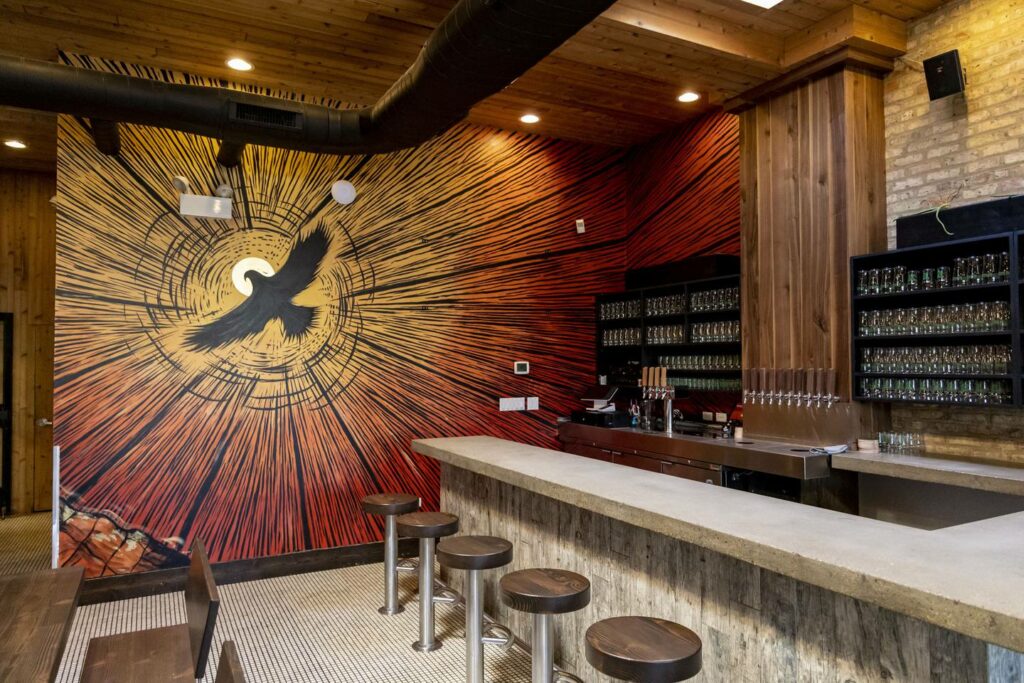
Hop Butcher for the World
4257 N. Lincoln Ave.
HopButcher.com
Details: Since launching in 2014, Hop Butcher had produced its beer mostly at Miskatonic in suburban Darien and 5 Rabbit Cervecería’s Bedford Park location, but to say things have taken a sizable turn for them in the past two years would be an understatement. In case you somehow missed the news, Hop Butcher bought the 55,000 square-foot production facility and warehouse in Bedford Park as well as Half Acre’s former Lincoln Avenue taproom and brewery in Chicago. In a much-anticipated move, the taproom officially re-opened as Hop Butcher’s in November of 2022.
“I think it’s been a busy and speedy learning curve to be entirely honest,” co-owner Jeremiah Zimmer tells us. “Last November, we’re looking at the honeymoon phase with lines of customers everywhere and we didn’t know what to expect. We didn’t know what ‘busy’ meant.”
“That being said, we don’t feel like the new kids on the block, either, because we’ve been established selling our beer for seven years, but now we were completely flipping it on its head because the taproom and balancing production was new territory.”
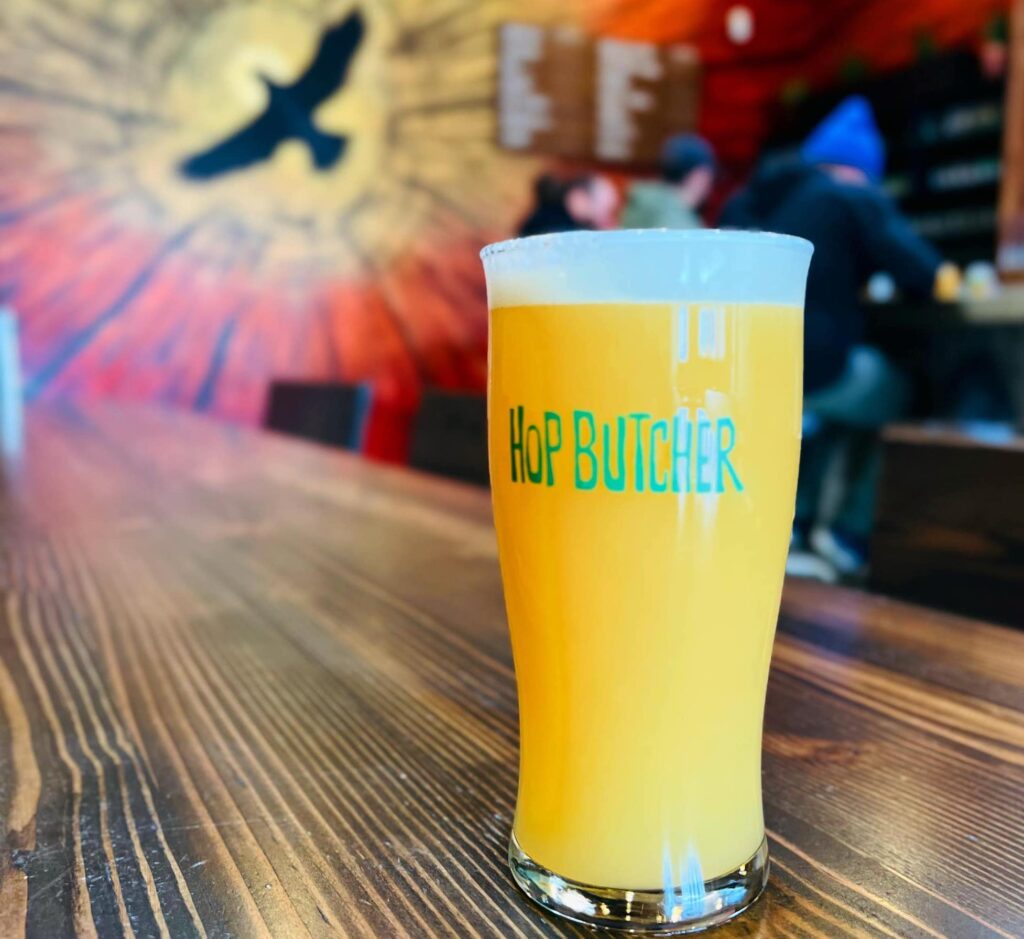
What they’re known for: An ode to Chicago, first and foremost, as their name is a play on Carl Sandburg’s famous poem and several of their beer names honor the city too, like Corn Cob Towers and Blizzard of ’67. Also, they happen to make some of the best hazy IPAs in the state. Noteworthy: You can find their cans for sale at Sox games and Goose Island’s new Salt Shed music venue.
We’re going to continue to do more of what got us here, and exploring smaller batches and experimental brews … whatever feels like we’re growing as brewers and pushing the boundaries. — Hop Butcher co-owner Jeremiah Zimmer
What caught our eye: According to Zimmer, Half Acre did “an amazing job of building a beautiful place to drink beer,” but Hop Butcher renovated to their liking, opening up the merchandise/tasting room a bit and modernizing and adding wall murals to the taproom. On a recent visit, we couldn’t help but notice how family friendly the space is, which makes sense considering Zimmer and co-owner Jude La Rose have seven children between them. “We have lots of crayons and apple juice available,” Zimmer adds.
There is also some added excitement surrounding the access to the smaller tanks at Lincoln Avenue, which has allowed them to brew English ales, kettle sours and experimental recipes on a smaller scale while still producing the big sellers out of Bedford Park. Bonus: It’s not uncommon to taste a beer in the taproom that was kegged only an hour earlier.
From the brewery: “We’re going to continue to do more of what got us here, and exploring smaller batches and experimental brews — whatever feels like we’re growing as brewers and pushing the boundaries. And with a hyper focus on fresh beer, as always.” — Jeremiah Zimmer
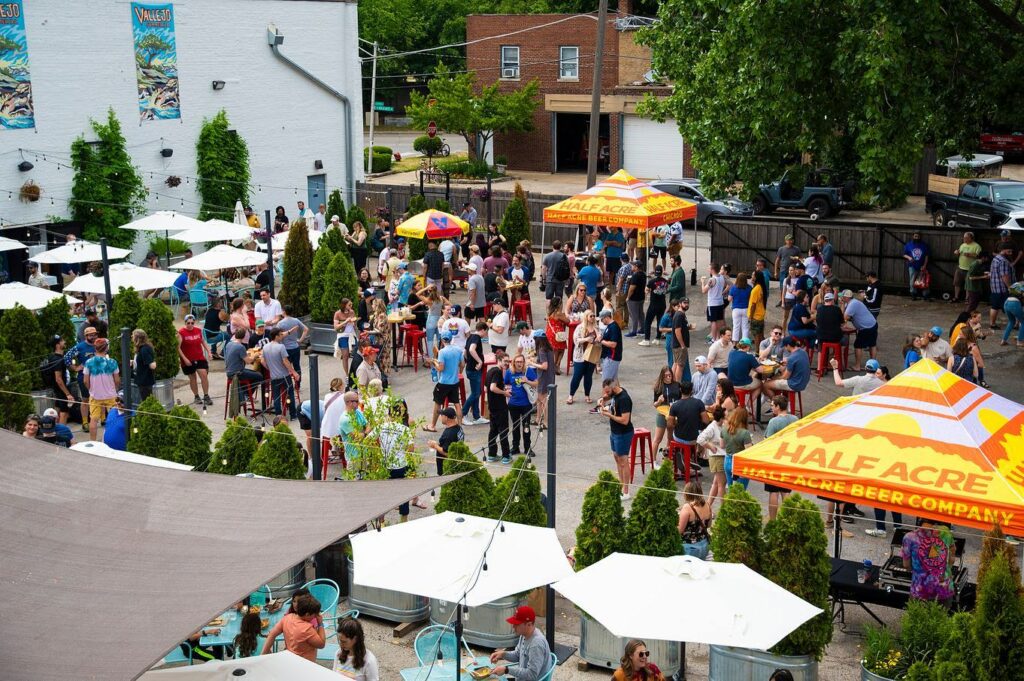
Half Acre Beer Company
2050 W. Balmoral Ave.
HalfAcreBeer.com
Details: Half Acre, originally founded in 2007 in Black River Falls, Wisconsin, is undoubtedly one of the heavy hitters on the Illinois craft beer scene. Half Acre’s Balmoral location — which includes a large brewing facility, taproom, store and beer garden — opened in 2015 and is perfectly tucked away in a tree-lined neighborhood on the northern edge of the city’s Ravenswood community. They sold their Lincoln Avenue taproom/facility to Hop Butcher at the end of 2021.
“The Lincoln Avenue taproom was a small and cozy space that was well constructed, but the brewing space was basically on top of the taproom,” says Half Acre’s marketing director Tim White. “It almost forced our brewers to interact with the customers more, and we learned a lot of things being there for more than a decade, not only as brewers, but as hosts.”
What they’re known for: Serving as one of Chicago’s pioneering breweries for one. “We are definitely a hoppy beer company for sure,” Tim says. Going back to their beginnings, there’s no denying that Daisy Cutter, their flagship American West Coast pale ale, helped put Half Acre on the map, but other beers like the Bodem IPA, Pony German pilsner, Tuna extra pale ale and Tome tropical pale ale have helped grow the brand.
Half Acre is also know for their events and ability to serve as party hosts. Lagertown — their own version of Oktoberfest — was held Sept. 9.
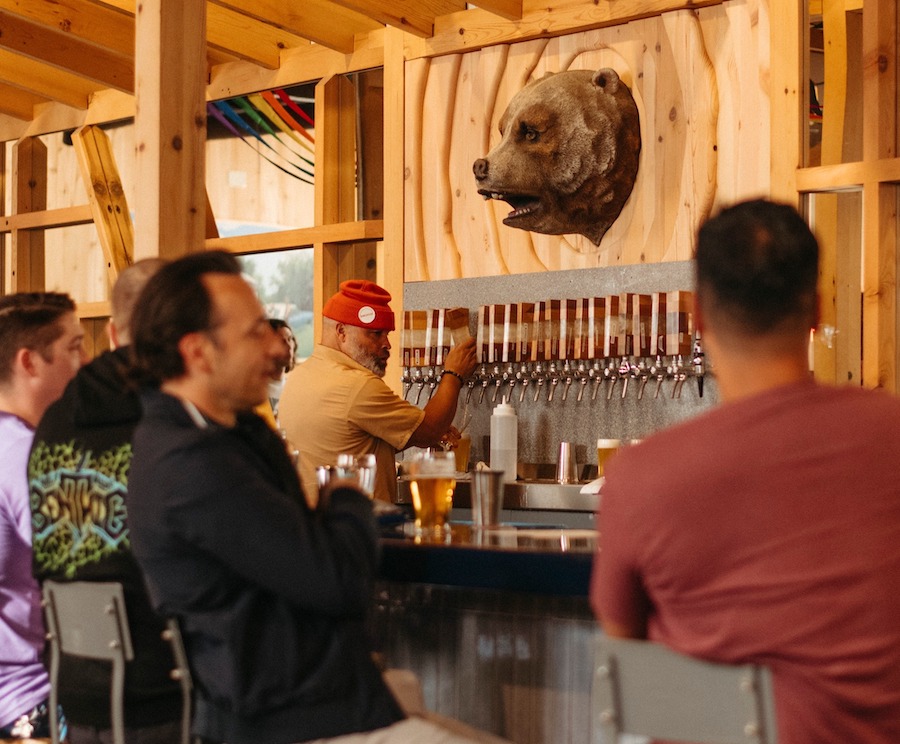
What caught our eye: Um, the beer garden. If you’ve been, you understand. It’s surrounded by the building, a fence and greenery and feels like its own little fortress. A fortress with great beer, that is. The taproom, even though it’s spacious and offers a variety of seating options, still feels like a cozy ski lodge to us with its exposed wood rafters and how it caters to groups.
We’re busy finding the hop combinations that bring out aroma and flavor in a new way to deliver more of an experience. … We feel like we owe it to our customers because the average beer drinker is far more well versed than ever before.” — Half Acre marketing director Tim White
Half Acre also boasts a retail shop that’s bigger and more active than most. In fact, they consider it more of a “customer lounge,” where patrons can feel comfortable enough to ask questions and have a 1-on-1 experience with a brewery rep. Plenty of growlers and cans are available to go, too.
From the brewery: “We certainly do hoppy beers really well, but we’re a little different because we can scale up or down and do the nuanced beers where it’s not just a big wall of hops coming at you. … “We’re busy finding the hop combinations that bring out aroma and flavor in a new way to deliver more of an experience. And that carries over to our barrel-aging program we’ve been ramping up over the last few years. We’re not just doing dark and boozy. We’ve really gotten into vanillas and cinnamons and cherries and the balance and nuance of flavors. We feel like we owe it to our customers because the average beer drinker is far more well versed than ever before.” — Half Acre marketing director Tim White
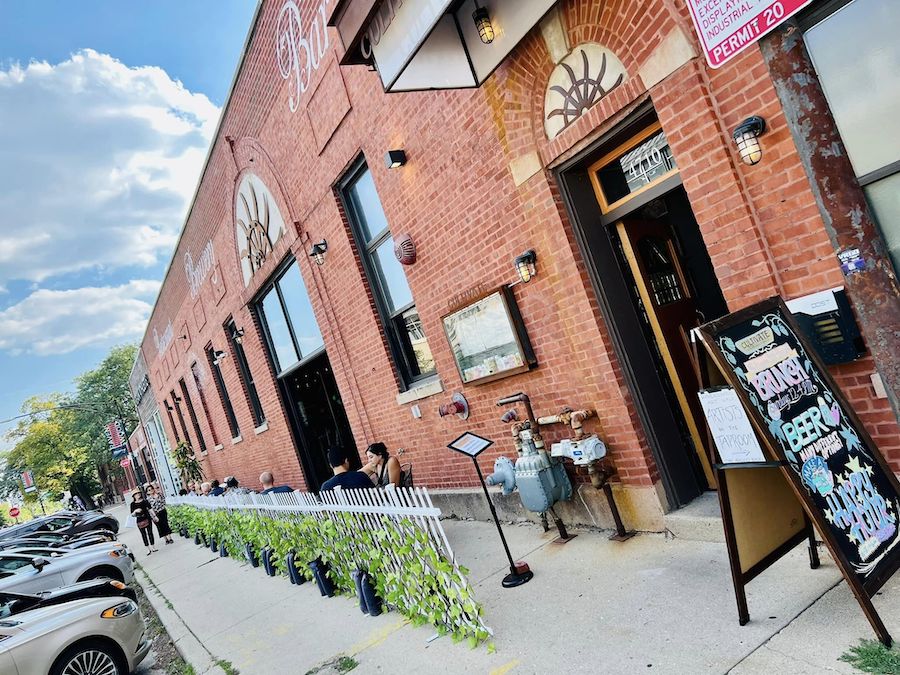
Cultivate by Forbidden Root
4710 N. Ravenswood Ave.
ForbiddenRoot.com/Cultivate
Details: Located in the former home of Band of Bohemia and conveniently just across from the Ravenswood Metra station, Cultivate, which opened its doors in November of 2021, represents Forbidden Root’s third brewery/restaurant location (joining venues in Chicago’s West Town neighborhood and Columbus, Ohio).
Considered Chicago’s first “botanic brewery,” Forbidden Root’s venues combine a creative food menu with a diverse beer program focused on barrel- and foeder-aged botanical beers.
What they’re known for: Considered Chicago’s first “botanic brewery,” Forbidden Root’s venues combine a creative food menu with a diverse beer program focused on barrel- and foeder-aged botanical beers. In other words, they take pride in utilizing ingredients such as herbs, spices, flowers, fruits and roots to create some truly unique brews.
What caught our eye: Simply put, the restaurant and bar area are gorgeous. Cultivate’s intimate side taproom is a hidden gem located just behind the restaurant and brewery. Expect a selection of board games, relaxed vibe and some special beer selections from Forbidden Root and other local breweries. Also, the food menu is next level, offering delectable creations like the duck & dumplings and pan-fried red snapper. Off the draft list, try the Hello Kitty hazy IPA or Summer Symphony, a crisp and mildly tart golden ale with hints of watermelon, lemon and lime.
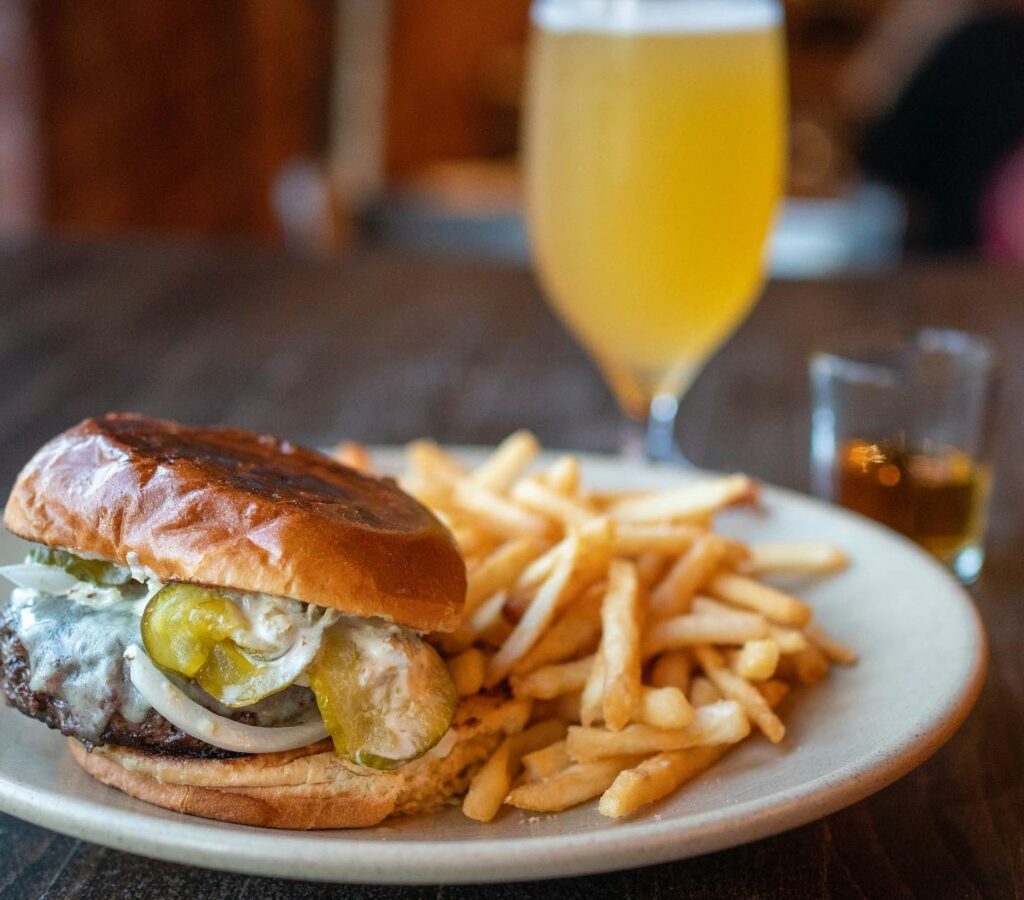
Another standout craft brewery in the Malt Row district that cannot be overlooked is Spiteful Brewery, located at 2024 W. Balmoral Ave, which was not an active member of the Illinois Craft Brewers Guild at the time of the printing of our summer issue.
